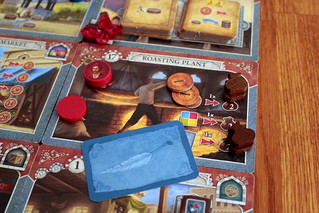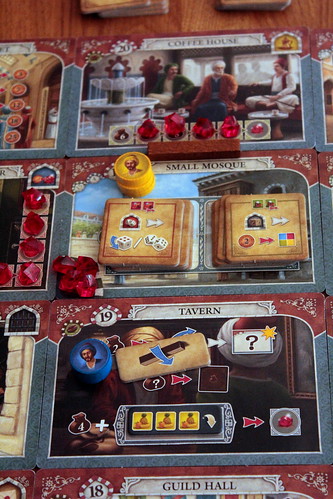| Strategy | Luck |
|---|---|
| Interaction | Components & Design |
| Complexity | Score |
Uzay Sari, merchant of Istanbul, was slumped at his table at the Yildizgeyik coffee house, nursing his third mocha for this morning. He still hadn’t spoken a word to his assistants. The three weeks since his wife had given birth to twins had not been kind to him. He could either sleep at home and be woken up by their crying every hour, or he could sleep on his office floor and wake up with a bad back. “Bless the man who discovered coffee,” he finally mumbled. “Without it, civilization would surely crumble.”
Coffee makes everything better. From Mondays at the office to Sunday afternoon cake, everything is better with coffee. And it’s not just me saying that, either. When it came to improving his Kennerspiel des Jahres Istanbul with an expansion, designer Rüdiger Dorn just said “Coffee makes everything better!” and created Istanbul: Mocha & Baksheesh. If you don’t know the base game then now might be a good time to check our review of Istanbul for the basics of how to move and trade in the bazaar.
So yeah, the big new thing in Mocha & Baksheesh is the famous Turkish coffee that joins the game as a new commodity to trade in. Coffee is different from the goods in the base game in some ways. It is not considered a good for effects that say “any good” and the amount of coffee you have is not tracked with a marker on your wheelbarrow. Instead, you use coffee bag tokens, which also means that the coffee you carry around is not limited by the size of your cart. You can have as much coffee with you as you want. When making this expansion, someone clearly understood what is important in life.
With the drink that keeps civilization running taking a central role in the game, it’s no surprise that all the new components in Mocha & Baksheesh are somehow related to coffee. The most important question, not only in the game but also in real life, is of course: where do I get it? Since we’re talking about bags of coffee beans here and not a Pumpkin Spice Latte, the obvious answer is not “whatever was the Turkish equivalent of that famous coffee chain at the time of the game” but “from the Roasting Plant.” As your primary supplier of coffee the Roasting Plant will accept pretty much anything in payment: two Lira, one of any good or one card from your hand, all will pay for two bags of coffee. And you can do all three at once to take six bags of coffee, just enough to get through a typical Monday.
The Roasting Plant is the cheapest and quickest source of coffee, but not the only one. You may also take a coffee token when you visit the new and improved Caravansary that now hands out complimentary coffee when you use it to draw bonus cards, or you may buy from the Coffee Trader, a new character that wanders the bazaar just like the Governor and Smuggler and sells you one coffee token for one good or two Lira. A steep price, but often more convenient than walking to the Roasting Plant.

The last way to pick up coffee is from the Guild Hall, another new location that hands out free coffee when you visit it for its real purpose: to pick up the new Guild Cards. Those cards are like the old bonus cards from the Caravansary, only with way too much caffeine in their bloodstream. They are powerful. As in “Pay three goods and receive 20 Lira” or “Gamble at the Tea House and receive twice the winnings” powerful. Game-changingly powerful, in other words. Drawing the right guild card when you need it can decide who wins the game. But all that power comes with a downside. Playing a Guild Card takes your full turn, you can do nothing else at all. Thanks to that little detail, the guild cards are interesting strategic decisions instead of ridiculously overpowered. Still, getting the right guild card or not when you need makes luck slightly more important than it was in the base game.
Back to the coffee. Personally, I’m perfectly happy just to collect as much coffee as I can for my own use, but most people will probably want it to help them win the game. And the good news is: coffee can do that. The direct way is to trade coffee for rubies at the Coffee House. Rubies are still what you need to win the game, so that’s a solid way to use your coffee. But there’s another way to use your coffee, and that’s where the baksheesh part of the title comes into play. Baksheesh can mean tip or bribe, or sometimes both at once, and when you visit the Tavern you can pay a small baksheesh in the form of coffee for a variety of services. For two coffees, you can hire some shady individuals to put a barrier between any two locations that only you can pass. There is only one barrier that moves around, so you can’t block a location completely, but you can certainly inconvenience everyone else. You can also use the Tavern to buy two new bonus tiles for coffee, one that makes encounters with Governor, Smuggler and Coffee Trader free for you and another that allows you to move as far as you want in a straight line. Finally, you can pay four coffee and a selection of other goods to take a ruby from the Sultan’s Palace, the Gemstone Dealer or the Coffee House. Don’t kid yourself about the legality of this, you’re hiring people to burgle one of those places.
That’s all that is new in Mocha & Baksheesh. It’s not a huge expansion, but it does add the right things to Istanbul. The most banal change might be that the bazaar gets a bit larger. Doesn’t sound like a big deal, but it forces you to plan your movement a little more carefully. It’s also not one of those expansions that tries to transform the game into something entirely new. With Mocha & Baksheesh you basically get more of the same, but in a good way. A new currency with coffee, new locations that interact with it, nothing that is unfamiliar to anyone that played Istanbul. But more options, more ways to collect rubies, more bonus tiles to collect – all that makes the game fresh again and gives you a few more things to think about. The only addition some might not be fond of are the guild cards, increasing the luck factor as they do, but that effect is slight enough that it shouldn’t bother most people. So yeah, more of the same, but that’s a good thing in this case. If you liked Istanbul, then you will like Mocha & Baksheesh as well. Personally, I like the game better with this expansion than without, and that’s not only because of all the coffee. But like I said, coffee does make everything better.







